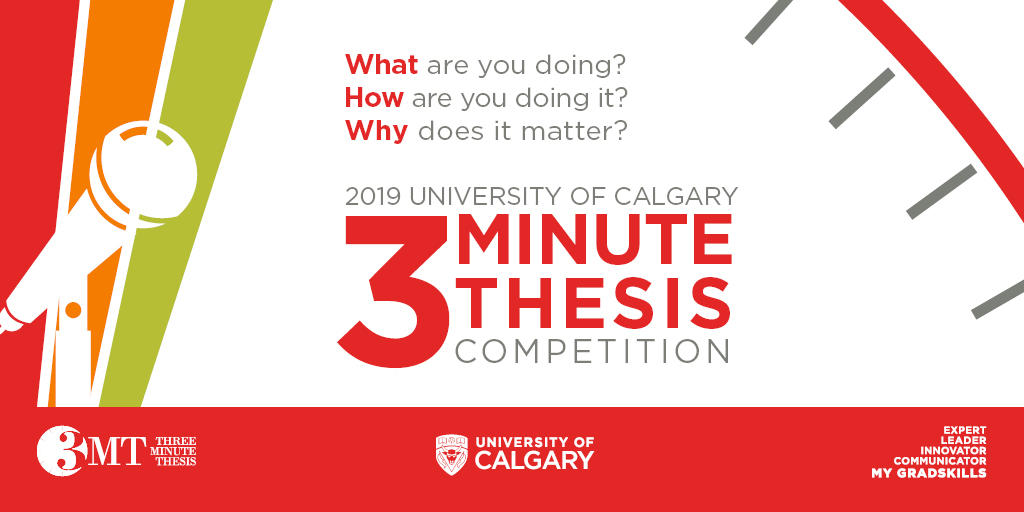Jan. 15, 2019
What's your story? Academiology and other ways grad students can sharpen their communication skills

“Transposition is a criterion of truth,” wrote Simone Weil in The Need for Roots. In other words, if you can’t put something in other words, how can you be sure you or your audience really understand it?
Many grad students experience this challenge when family or friends pose that perennial question: “what exactly are you doing in your grad degree?” Answering in a way that captures the nuance of graduate research without losing the audience is an important skill. UCalgary grad students have many opportunities to cultivate that ability.
Creating a plain-language ‘big picture’ understanding of their work has many benefits for students, whether it helps in developing a pitch or research brand, raising awareness of how grad research benefits the community, or resisting the tide of “fake news” with storytelling rooted in expert thought.
Storytelling with Academiology
For Madison Bradley, an interdisciplinary master’s student in biological anthropology, one of the greatest benefits is the chance to share the thrill of discovery. An enthusiast for science communications, Bradley realized early in her degree that she wanted to complement her academic focus with an outlet to share science with a broad audience.
Bradley teamed up with master’s student Monica Henderson (communications) and PhD candidate Jaclyn Carter (English) to apply for financial support from the Graduate Students’ Association Quality Money program. Following a successful proposal, the group launched a grad student blog called Academiology.ca.
Academiology gave Bradley a way to combine her love of writing and her interdisciplinary research. Through word-of-mouth, grad students across disciplines started submitting writing, photo essays and short videos. All submissions are reviewed by a volunteer editorial panel of grad students.
Topics include research in progress as well as grad school life. For example, one student submitted a reflection on the experience of writing a novel for their English PhD program.
Part of Bradley’s role as editor-in-chief is gauging how clearly colleagues from other fields are communicating, and where they can make tweaks. “There’s a certain safety in using your own language, and we tend to get lost in the jargon of our fields,” says Bradley. “Effective academics can communicate to a wide audience without resorting to specialized terminology.”

Graduate Research Photo Competition.
Expertise and the ‘research brand’
Writing for a general audience marks a fine line for some academics, who may consider peers publishing work on mainstream or non-peer-reviewed platforms as a form of self-promotion. However, grad students preparing to transition into a career may find value in establishing a research brand online. Blogs like Academiology can help.
Being skilled in clear communication is important for grant applications, and with entrepreneurship on the rise in Calgary, it’s essential for pitching and marketing a business idea.
Keeping it real
Another motivation behind Academiology is the persistence of "click-bait" science journalism, which Bradley describes as articles that make flashy but unlikely claims or present research as being more definitive and closer to paradigm-disrupting outcomes than it really is.
For Bradley, academics who communicate well can counter the hyperbole of click-bait claims. “When academics write about their own work, you’re more likely to get a more realistic, balanced and accurate picture,” she says.
Practicing your pitch
While Academiology may not have viral readership, the intent to provide credible perspectives on research from those carrying it out aligns it with academic news sources like The Conversation Canada.
The Conversation is a global news platform that works with academics to provide expert views on new research and current issues. Most articles featured in The Conversation are penned by professors, though doctoral students are also welcome to submit. Stories are often picked up and repeated by other major news platforms globally, giving students a potentially wide and diverse audience.
Academiology gives students a place to make a dry run before pitching a story to a platform like The Conversation.

3 Minute Thesis Competition.
Visual communication: Graduate Research Photo Competition
Grad students have opportunities to engage in other forms of research communication. Consider the annual Graduate Research Photo Competition run jointly by the Faculty of Graduate Studies and the Graduate Students’ Association, in which students practice both visual and written communication.
For the first time this year, students are asked to submit two written descriptions of how their photos relate to their research – one for a technical audience and one for a general audience. These descriptions will form part of the rubric for the judges to assess first, second and third place, with prizes of $500, $300 and $100 respectively.
Oral communication: the University of Calgary Three Minute Thesis
And of course, the 2019 UCalgary 3MT is coming soon. Thesis-based grad students participating in this internationally-renowned communications competition have three minutes and a single slide to deliver a compelling account of their research for a general audience.
My GradSkills provides workshops and feedback sessions to help graduate students prepare and hone their presentation skills. “The 3MT is a competition, but the focus and value is really in the process of doing it,” says Dr. Tara Christie, PhD and manager, My GradSkills. “It’s an amazing journey, and every year we see grad students build their confidence and abilities through the course of the competition. We see a huge transformation in the quality and delivery of the presentations, and it’s an inspiring way to learn about the research students are doing.”
Grad students can submit to Academiology.ca at any time, or volunteer on the editorial board. The Graduate Research Photo Competition is open from Jan. 21-Feb. 11. Registration for the UCalgary 3MT runs from Feb. 1 to March 1.
